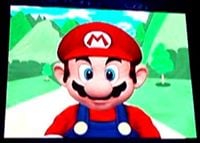Mario in Real Time: Difference between revisions
SmartieMaxx (talk | contribs) (This source (http://www.youtube.com/watch?v=R1t6iNG28zI) provides year of introduction.) |
(+references) |
||
| Line 1: | Line 1: | ||
[[Image:MarioInRealTime.jpg|thumb|right|'''Mario in Real Time'''.]] | [[Image:MarioInRealTime.jpg|thumb|right|'''Mario in Real Time'''.]] | ||
'''[[Mario]] in Real Time''' (also known as '''MIRT''') is an interactive system that was introduced around 1992, and has since been used by [[Nintendo]] in various [[Wikipedia:trade fair|trade fairs]]. Thought up by [[Wikipedia:Minoru Arakawa|Minoru Arakawa]], MIRT is notable for introducing [[Charles Martinet]] as Mario's voice (prior to his videogame debut in ''[[Mario's FUNdamentals]]''). | '''[[Mario]] in Real Time''' (also known as '''MIRT''') is an interactive system that was introduced around 1992<ref>[http://www.youtube.com/watch?v=R1t6iNG28zI Youtube] (Accessed 4-10-12)</ref>, and has since been used by [[Nintendo]] in various [[Wikipedia:trade fair|trade fairs]]. Thought up by [[Wikipedia:Minoru Arakawa|Minoru Arakawa]], MIRT is notable for introducing [[Charles Martinet]] as Mario's voice (prior to his videogame debut in ''[[Mario's FUNdamentals]]''). | ||
[[Image:Mario_Head.jpg|thumb|left|MIRT as it appears in ''Mario Teaches Typing 2''.]] | [[Image:Mario_Head.jpg|thumb|left|MIRT as it appears in ''Mario Teaches Typing 2''.]] | ||
MIRT displays Mario on a screen, through which he can talk to those attending the trade fair. Charles Martinet himself (previously Stevie Coyle) works the device, standing out of view and reciting Mario's lines, which are instantly reiterated by the heroic [[plumber]]. Martinet also provides Mario's movement through sensors courtesy of [http://www.manta.com/coms2/dnbcompany_jqmh38 Simgraphics Engineering], who developed the '''VActor''' technology on which MIRT works. (''[[Mario (series)|Mario]]'' sound effects and various impossible movements are also available to Martinet.<ref>[http://www.youtube.com/watch?v=AWfZjVbFFkc Youtube] (Accessed on 3-1-09)</ref>) Although Martinet is hidden from the audience, he can see and hear them through a hidden camera and microphone. In addition to trade shows, an early Mario in Real Time was used to animate [[Mario's face]] in ''[[Mario Teaches Typing]]'' and [[Mario Teaches Typing 2|its sequel]]. | MIRT displays Mario on a screen, through which he can talk to those attending the trade fair. Charles Martinet himself (previously Stevie Coyle<ref>[http://www.youtube.com/watch?v=R1t6iNG28zI&list=PL7E7814CCA61FB484&index=39 Youtube] (Accessed 4-20-13)</ref>) works the device, standing out of view and reciting Mario's lines, which are instantly reiterated by the heroic [[plumber]]. Martinet also provides Mario's movement through sensors courtesy of [http://www.manta.com/coms2/dnbcompany_jqmh38 Simgraphics Engineering], who developed the '''VActor''' technology on which MIRT works. (''[[Mario (series)|Mario]]'' sound effects and various impossible movements are also available to Martinet.<ref>[http://www.youtube.com/watch?v=AWfZjVbFFkc Youtube] (Accessed on 3-1-09)</ref>) Although Martinet is hidden from the audience, he can see and hear them through a hidden camera and microphone. In addition to trade shows, an early Mario in Real Time was used to animate [[Mario's face]] in ''[[Mario Teaches Typing]]'' and [[Mario Teaches Typing 2|its sequel]]. | ||
Martinet occasionally voices an off-screen [[Luigi]] (as well as [[Mama Mario|Mama]] and [[Papa]]) in MIRT; in fact, this is how Luigi's voice originated. A '''[[Wario]] in Real Time''' ('''WIRT''') and '''[[Donkey Kong]] in Real Time''' ('''DKIRT''') also exist<ref>[http://archive.gamespy.com/interviews/august02/mario/ GameSpy] (Accessed on 3-1-09)</ref>, the former of which was used at Winter CES 1994 <ref>[http://www.youtube.com/watch?v=E_ZTt0YKpKY#t=7m20s Youtube] (Accessed on 8-8-11)</ref>. Charles Martinet himself appeared on-screen with MIRT software at [[Wikipedia:E3|E3]] 2006.<ref>[http://en.wikipedia.org/wiki/Charles_Martinet#Video_games Wikipedia] (Accessed on 3-1-09)</ref> | Martinet occasionally voices an off-screen [[Luigi]] (as well as [[Mama Mario|Mama]] and [[Papa]]) in MIRT; in fact, this is how Luigi's voice originated. A '''[[Wario]] in Real Time''' ('''WIRT''') and '''[[Donkey Kong]] in Real Time''' ('''DKIRT''') also exist<ref>[http://archive.gamespy.com/interviews/august02/mario/ GameSpy] (Accessed on 3-1-09)</ref>, the former of which was used at Winter CES 1994 <ref>[http://www.youtube.com/watch?v=E_ZTt0YKpKY#t=7m20s Youtube] (Accessed on 8-8-11)</ref>. Charles Martinet himself appeared on-screen with MIRT software at [[Wikipedia:E3|E3]] 2006.<ref>[http://en.wikipedia.org/wiki/Charles_Martinet#Video_games Wikipedia] (Accessed on 3-1-09)</ref> | ||
Revision as of 23:06, April 19, 2013
Mario in Real Time (also known as MIRT) is an interactive system that was introduced around 1992[1], and has since been used by Nintendo in various trade fairs. Thought up by Minoru Arakawa, MIRT is notable for introducing Charles Martinet as Mario's voice (prior to his videogame debut in Mario's FUNdamentals).
MIRT displays Mario on a screen, through which he can talk to those attending the trade fair. Charles Martinet himself (previously Stevie Coyle[2]) works the device, standing out of view and reciting Mario's lines, which are instantly reiterated by the heroic plumber. Martinet also provides Mario's movement through sensors courtesy of Simgraphics Engineering, who developed the VActor technology on which MIRT works. (Mario sound effects and various impossible movements are also available to Martinet.[3]) Although Martinet is hidden from the audience, he can see and hear them through a hidden camera and microphone. In addition to trade shows, an early Mario in Real Time was used to animate Mario's face in Mario Teaches Typing and its sequel.
Martinet occasionally voices an off-screen Luigi (as well as Mama and Papa) in MIRT; in fact, this is how Luigi's voice originated. A Wario in Real Time (WIRT) and Donkey Kong in Real Time (DKIRT) also exist[4], the former of which was used at Winter CES 1994 [5]. Charles Martinet himself appeared on-screen with MIRT software at E3 2006.[6]
